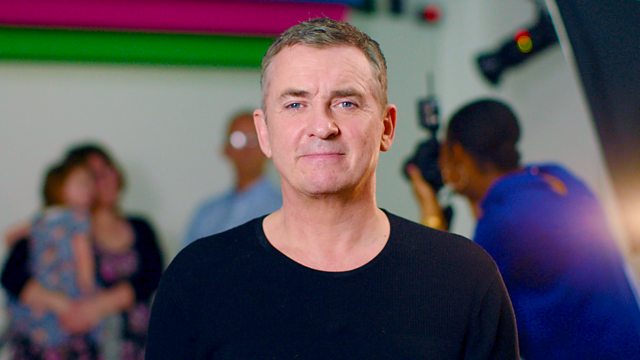
Childhood Eye Cancer Trust
Shane Richie presents this month's Lifeline appeal for the Childhood Eye Cancer Trust, a charity dedicated to supporting children diagnosed with eye cancer, and their families.
Last on
Childhood Eye Cancer Trust

Nothing can prepare a family for the devastating news that their child has cancer – then hearing that the only way to stop that cancer from spreading could be the removal of one (or very rarely both) of their child’s eyes.
The Childhood Eye Cancer Trust (CHECT) is the UK charity dedicated to helping families affected by retinoblastoma, a rare and aggressive eye cancer which affects babies and young children, mainly under the age of six.
Approximately one child per week in the UK is diagnosed. We’re there for each and every family by offering them support following diagnosis and throughout treatment.
Around 98 per cent��of children will survive,��but early diagnosis is important to help save a child’s sight, eyes and life. Unfortunately, approximately half of all children will have to have an eye removed to stop the cancer spreading.
We also raise awareness of the signs of the disease – most commonly a white glow in a child’s eye spotted in certain light, sometimes in a flash photo.
We urge parents and medical professionals to look out for the symptoms and recognise that, although rare, it could be a sign of cancer and will need to be checked out urgently.
We fund world class research into improving our understanding of retinoblastoma as well as effective treatments and reducing the negative impact on those affected by the disease.
For more than 30 years we’ve been helping families, but we don’t receive any money from the government - we rely on��public support��to fund our vital work.
Website��
Shane Richie

I am so pleased to support this Childhood Eye Cancer appeal.
For the families that find out their baby or young child has eye cancer, the diagnosis is devastating.
Retinoblastoma is very rare and survival rates are high, but the lasting effects of the disease can be life-altering, with around half of survivors having one of their eyes removed. Luckily, the Childhood Eye Cancer Trust are there to offer their support to every single family in the UK each week that face this terrible news.
For such a small charity, the Childhood Eye Cancer Trust have a huge impact on the lives of those affected by retinoblastoma as well as raising awareness and funding important research. Your support can help ensure they continue to help hundreds of UK children and their families - just like Alice, Harry, and Josh and Jamie.
Alice

It was during a game of pirates, when Alice put an eye patch on over her right eye, that her mum Emily realised that Alice could no longer see.
Emily also noticed that in certain lighting Alice’s eye looked almost see-through. She googled the symptoms and information about retinoblastoma came up.
After several visits to GPs, eventually an urgent referral was made which led Alice and her family to the Royal London Hospital, one of two specialist centres for retinoblastoma in the UK. Within days after her urgent referral the diagnosis was confirmed – she was just two years old at the time.
After months of chemotherapy, things were starting to look good for Alice. However, in February last year, Alice relapsed and the difficult decision was made to remove her eye.
This is why CHECT need your donations, so that support workers can give families, like Alice’s, the skills and confidence they need to cope.
Harry

Harry was diagnosed with retinoblastoma when he was eight years old. His case is very unusual, as retinoblastoma typically affects children from birth up to six years old. Doctors thought they might have a chance of saving Harry’s eye but following two long years of chemo, the only option was for Harry to have his left eye removed.
As well as having dealt with a lengthy cancer battle - Harry found himself struggling, and needed counselling.
As retinoblastoma is rare, the chances of encountering someone of a similar age who has had the disease is incredibly unlikely. ��It can leave those affected, feeling isolated.
CHECT offer life-long support those affected by Rb - through adolescence beyond. Their teenage events and Teen Focus Council gives teenagers, like Harry, an opportunity to share their experiences and boost their self-esteem.
Now 17, Harry has the confidence to play basketball every week for an Under-18s basketball team and even coach the Under-13s squad.
Rob

Born in the 70’s, Rob was
diagnosed with retinoblastoma when he was 14 months old. To stop the cancer
from spreading, Rob’s left eye was removed. However, having the heritable form
of the disease, Rob’s battle with retinoblastoma didn’t end there.
In 2002, Rob’s son Josh was born. At first, there were no visible signs of
tumours, however following more tests, Joshua was found to have inherited his
father’s gene mutation and was diagnosed with retinoblastoma at just six weeks
old.
Rob’s second child Jamie was born in 2011, unfortunately he also had retinoblastoma. An early diagnosis at just four days old, combined with advancements in clinical treatments, doctors were also able to save Jamie from needing to have an eye removed.
Thanks to CHECT-funded research and early screening, Josh and Jamie’s sight has been saved. Both boys will be able to live almost normal lives, including being able to drive - something their Dad sadly, is unable to do.
Credits
| Role | Contributor |
|---|---|
| Presenter | Shane Richie |
| Executive Producer | Sandy Smith |
| Series Producer | Hardeep Giani |
| Director | Simon Goodall |
Broadcasts
- Sun 24 Mar 2019 13:50
- Wed 27 Mar 2019 13:35
